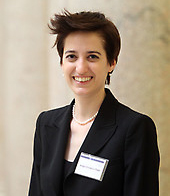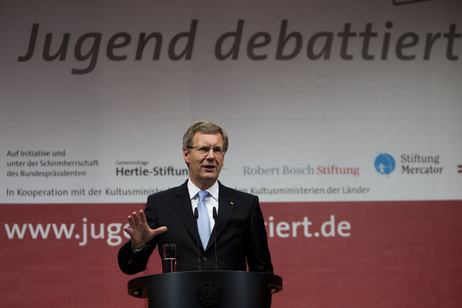Broadway Theatre
New York, New York
9:50 P.M. EDT
THE US-PRESIDENT: Thank you. Thank you so much. (Applause.) Thank you, everybody. Thank you. (Applause.) It is good to be back in New York City! (Applause.) Good to be back on Broadway. (Applause.) Thank you, Whoopi Goldberg. We love you. (Applause.) How about the cast of Sister Act? Give them a big round of applause. (Applause.)
Everybody, you can take a seat. Just relax. (Laughter.) It is wonderful to follow Sister Act. (Laughter.) It helped me on my research, figuring out what continent to send Malia and Sasha. (Laughter.) They're getting a little too old and too cute. (Laughter.)
It is wonderful to be with all of you tonight. And I will not spoil a great show with a long speech. But I do have a few things to say. (Laughter.) You know, I was reflecting back on my last campaign and the 2008 election. And a lot has changed since then. I am a little grayer. (Laughter.) My daughters say it makes me look distinguished. And Michelle says it makes me look old. (Laughter.) But I think back to that day in Grant Park on Election Day, and speaking to the American people and trying to absorb this incredible honor. And I said to so many of you that as special as this night was, this was not the end; this was just the beginning. (Applause.)
And the reason I said that was because I had decided to run for President because I thought the gap had grown too large between the country we know we can be and the country as it was. We'd gone through a decade in which incomes and wages for ordinary people had actually gone down. We had gone through a decade that had seen a hemorrhaging of manufacturing in this country. We had gone through a decade in which the costs of everything from health care to college tuition to gas were going up and too many families were just treading water. We'd gone through a decade of two wars, a diminished respect for America around the world.
We had kicked the can down the road for too long on critical issues like having an energy policy that would allow us to free ourselves from our dependence on foreign oil, and would allow us to clean up the environment and make sure that the new jobs of the future were created right here in the United States of America.
So we knew that we had a lot of work to do. We knew that we had a steep hill to climb. Now, it turned out that the hill was even steeper than we thought. Because what we didn’t know fully at the time, what we didn’t fully appreciate was that we were already in the midst of the worst recession since the Great Depression. We had lost 4 million jobs before I was even sworn in, and we'd lose another 4 million in the few months right after my inauguration.
And so all the hardships that families had been feeling, the fact that they felt as if the American Dream was slipping away from them -- all those problems were compounded by this incredible crisis.
And so I had to make a series of decisions very quickly. And they were big and often tough decisions. We had to make sure that we yanked the economy back from the brink of a Great Depression. We had to make sure that we stabilized the financial system so that we didn’t have a full meltdown, and so that businesses could get financing and keep their doors open and keep their employees and make payroll.
We had to save an auto industry. I didn't anticipate being a CEO of a couple auto companies. (Laughter.) But we had to make sure that we saved those iconic companies from liquidation because a million jobs depended on them. (Applause.) And as a consequence of those decisions, all of which were hard, all of which were controversial, many of which were not popular, we were able to bring the economy back from the brink. And we were able to stabilize the financial system. An economy that was shrinking by 6 percent a year began growing again. An economy that was shedding hundreds of thousands of jobs has now over the last 15 months created more than 2 million jobs in the private sector alone. (Applause.)
And along the way, we made extraordinary progress on the commitments that I made to the American people and commitments we made to each other during the campaign. So we passed health care so that families will never go bankrupt when they get sick in this country again. (Applause.)
And we passed financial reform to make sure that consumers aren’t cheated and we don't see taxpayer bailouts for the financial system again. (Applause.)
And we passed equal pay for equal work because we thought that was the right thing to do. (Applause.) And we ended “don't ask, don't tell,” so that anybody can serve this country regardless of who they love. (Applause.)
And we expanded national service for young people so they could participate and contribute into the building of America. We made the largest investment in clean energy in our history and the largest investment in education. (Applause.) And we changed the student loan system so that we weren’t given billions of dollars to banks, but we were giving them directly to students. (Applause.)
And overseas, we’ve brought down -- we’ve brought back a hundred thousand troops out of Iraq, and we ended the combat mission there. (Applause.) And because of the extraordinary diplomacy of our Secretary of State Hillary Clinton and all the great work that's been done -- (applause) -- we were able to help restore a sense of standing and a sense of purpose around the world.
And so the track record of the last two and a half years is one that I could not be prouder of. And we couldn’t have accomplished it -- because of you. (Applause.) We could not have accomplished it without you. But what is also true is we’ve got so much work left to do, because there are still millions of people across the country who are hurting. I hear from them every day. People who send out 16, 30, 50 resumes, and haven’t gotten an answer back and are starting to feeling they will never find a job again. People who have lost their homes. People who have seen their small business and their life savings lost in the crisis.
And some of the big projects that we set for ourselves during the campaign have not yet been done. We still don’t have an energy policy that is suitable for the 21st century. We still have to invest in clean energy, that solar panels and wind turbines are built right here in this country, and electric cars are built right here in the country -- (applause) -- and we are focused not on the energy sources of the past, but the energy sources of the future. We still have that project to deal with climate change in a serious way. Those things haven’t changed.
We still have so much more work to do on education. We have made great strides, but we have to hit the goal that I set that once again we will have the highest proportion of college graduates of any country in the world. (Applause.) And every single young person who is willing to apply themselves can afford to go to college without taking on hundreds of thousands of debt. (Applause.) That is still something that we’ve got to accomplish.
We’ve still got to implement health care reform -- because there are a whole bunch of folks who want to undo what we’ve accomplished. We have not yet gotten immigration reform done. (Applause.) And we are a nation of immigrants as well as a nation of laws, and we’ve got to have a system that makes sure that every single person who wants to come here and become a part of the fabric of this society, that they have fair and legal and orderly ways that they can legally immigrate to this country. (Applause.)
So we’ve got a huge amount of work left to do. And we’re going to have to make some very tough decisions if we are going to be able to make the investments that are going to be critical to America’s future.
That’s what this budget debate in Washington is all about right now. You’ve already heard a little bit about it, and over the next few weeks it’s going to start heating up and we’re going to have to make some very, very tough decisions -- because we need a government that lives within its means. You all live within your means -- hopefully. (Laughter.) And that means that you’ve got to prioritize. We don’t have unlimited resources, so we’ve got to decide what’s important to us.
But this is not just a budget question; this is a values question. So I’ve put forward a plan that says, yes, we can cut every program that’s not working and every little bit of waste that we can find across the board, whether it’s in the Defense Department -- (applause) -- or it’s in social service programs that don’t work. We can’t waste money, because times are tight.
But what I’ve also said is we can’t stop investing in the things that are going to make us competitive in the future. (Applause.)
We can’t stop investing in education. We can’t stop investing in medical research. We can’t stop investing in building our infrastructure, all the things that help make us the greatest country in the world. (Applause.) We cannot stop caring for our seniors and the disabled and the most vulnerable in our society. (Applause.)
And so what you’re going to see over the next several months, but also over the next several years, is a debate about who we are -- because there’s a way for us to solve our deficit problems and our debt problems in a way that's fair and balanced and that shares sacrifice so that we’re not just doing it on the backs of the poor. (Applause.) We’re not just doing it on the backs of those without a voice, or those who can’t afford a lobbyist in Washington. (Applause.)
One of the disagreements that we have is even after we’ve made all these cuts -- and we’re making some painful, difficult decisions. The notion that I, who, because a bunch of you guys bought my book, am actually doing very well -- (laughter) -- should not have to pay a little more; the notion that I’d get a $200,000 tax break, and as a consequence of that tax break, hundreds of kids might not be able to go to Head Start, or as a consequence of a tax break for me, that senior citizens might end up having to pay thousands of dollars more for their Medicare -- see, that's not who I think we are. (Applause.)
I don't believe in a small America or a cramped vision of America that says only a few can do well. I believe in a big America, an expansive and compassionate and generous America, and a bold America and an optimistic America, and one that says it does not matter who you are or what you look like or where you come from, everybody has got a chance at the American Dream. (Applause.)
And we’ve all got an obligation to help each other achieve our dreams; that we’re not in this just for ourselves; that you’re not just on your own; that I am my brother’s keeper, I am my sister’s keeper. (Applause.) And I believe that not just out of a sense of compassion or charity, but because if I drive by a school and I see kids out there playing in the playground and I know that they’ve got a great teacher in there and they're learning their math and they're learning their science, and they're going to be able to get on track to college and a career, I say to myself, you know what, that makes me feel good because that's better for my life -- knowing that kids in my country all have a shot. (Applause.)
And if I -- if at some point ever I’m able to walk in Central Park again -- (laughter) -- and I’m taking a stroll and I see an elderly couple pass by me and they're holding hands, and I’m thinking, oh, that's going to be me and Michelle some day -- (applause) -- and I know that they’ve got the security of a stable retirement and they're not going to have to worry that if they get sick, they’ll lose everything -- that makes my life better. (Applause.)
That's the vision I’ve got for America. That's that what we’re fighting for. That's why you campaigned for me in 2008. (Applause.) That's why I need you to campaign for me again in 2012. Our job is not done. We’ve got to fight for that vision. (Applause.)
AUDIENCE: Yes, we can! Yes, we can!
THE PRESIDENT: Now, let me just say that I know I’m preaching to the choir here. (Laughter.) But I also know that over the last two and a half years there have been times where you think to yourself, gosh, I’m not feeling as hopeful. (Laughter.) This change, I’m not sure I can believe in it. (Laughter.) I know you still got the poster. (Laughter.) But there have been times where you say, you know, how come we didn’t get the public option? (Laughter.) Or, why did health care take so long? Or the -- you know, I know that there are times where you get frustrated and you --
AUDIENCE: Never!
THE PRESIDENT: Well, no, that’s not true. (Laughter.) Maybe you don’t get frustrated, but -- and the reason I say that is I get frustrated. I would love to be able to just -- our whole program just got implemented in six months and I would then just relax. (Laughter.)
But you know what? We live in a democracy, and it’s a big and messy democracy. And it’s noisy and it’s contentious. But that’s what democracy is. (Applause.) It requires engagement and it requires citizens to take these debates seriously and to pay attention, and to suffer setbacks.
Sometimes, people say, oh, you know, I don’t know, during the campaign everything was so terrific, and now governing seems so much more frustrating. And I want to remind everybody, the campaign seemed frustrating a lot of times. (Laughter.) It wasn’t perfect either. And we had setbacks and we had struggles, and there were times where we didn’t get to where we wanted to go as quick as we wanted.
But I just want everybody to understand we have made enormous progress. (Applause.) And the only reason we’ve made progress is because all of you stayed committed, and all of you stayed engaged. And all of you, no matter the setbacks, said, I still believe that America can be better and I’m going to play a part in it. (Applause.) This campaign was never just about me. It was about the commitments we made to each other as Americans, and the commitments we’re making to the next generation.
So don’t sit back and wait. Don’t sit back and wait for me. I need you. I need all of you to knock on doors and make phone calls and send emails, and do whatever it is that you need to do -- because we are going to need the same energy and the same passion and the same engagement. And if we do, then I promise you there is nothing that will stop us and we will get done everything that we promised we would get done. (Applause.)
God bless you, New York. (Applause.) I love you. Thank you. (Applause.)
END
10:11 P.M. EDT





